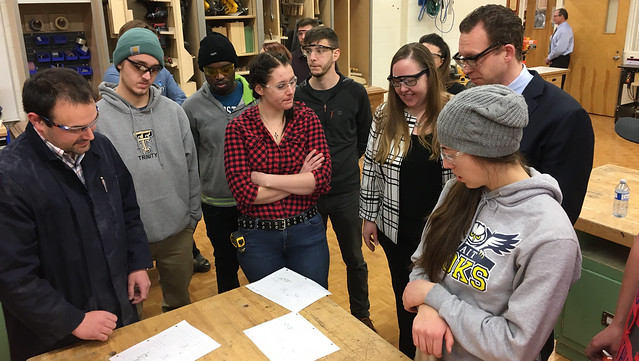This release was issued under a previous government.

Minister Marlin Schmidt and Minister Christina Gray visit with mill work and carpentry students at NAIT.
Beginning this month, proponents on large-scale, public infrastructure projects will be required to utilize apprentices in the 11 construction-related trades. The new policy requires apprentices to participate on major public projects valued over $15 million, or those that will require at least two years to complete.
The majority of an apprentice’s training is completed on the job and the new requirement means Albertans will have increased opportunities to access work-site training.
“As our economy recovers, we’re doing everything we can to get Albertans back to work. We are very fortunate that Alberta’s industry has played such a key role in delivering on-the-job experience, and this requirement is another way for our industry partners to continue their leadership and mentorship of apprentices.”
“As a company in the structural steel business, we, and essentially everyone in the industry, recognize the important role we play in developing skills and the difference that apprentices make on our job sites. We take great pride in our approach to helping and mentoring these men and women to learn on the job because we know that it’s good for business and boosts the performance and outcomes of these major projects.”
“Alberta’s apprenticeship system plays a central role in ensuring our province develops the skilled workforce that will enable future prosperity and competitiveness. Industry plays a critical role in the success of this learning model, through providing training, mentorship and employment to apprentices. This role needs to be recognized, celebrated and encouraged.”
“Apprentices will tell you that real-world experience and mentorship are invaluable to their training and development. This is an important initiative that recognizes the value of supporting apprentices and apprenticeship training on publicly funded projects.”
“This will definitely help enable apprentices to learn, to be supported career-wise and to move forward. It will also help ensure a better standard of living for apprentices and a strong, well-educated workforce.”
In addition, sub-contracts of $500,000 or greater will also be required to comply with the new requirement and employ at least one apprentice.
The trades subject to the new requirement are: carpentry, crane and hoisting equipment operations, electrical, elevator construction, gas-fitting, heavy equipment technician, ironworker, plumbing, refrigeration and air-conditioning mechanics, sheet metal and welding.
Quick facts
- As of Dec. 31, 2017, there were about 50,000 registered apprentices in the province in more than 50 designated trades and occupations.
- $46 million for apprenticeship delivery was committed under Budget 2017.
- About 80 per cent of an apprentice’s training is conducted on the job under the supervision of a certified journeyperson or qualified individual. Approximately 20 per cent of an apprentice’s training is done in class or in a lab setting through an approved training provider.
- Although Alberta has only 13 per cent of Canada’s labour force, about 21 per cent of the country’s apprentices train here.